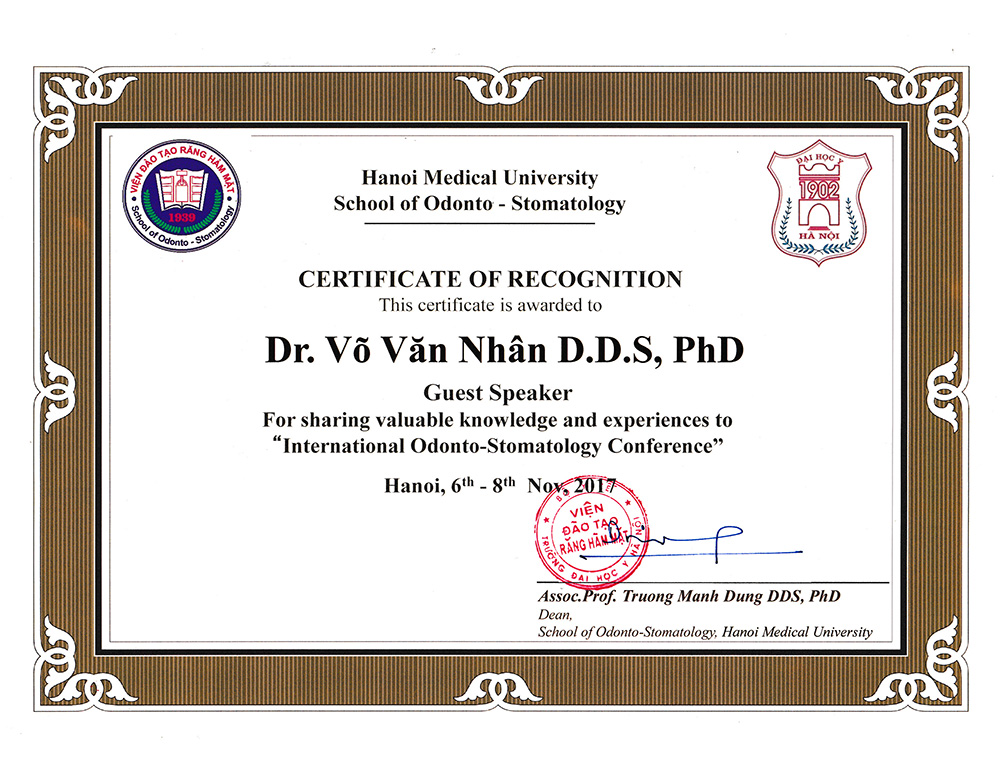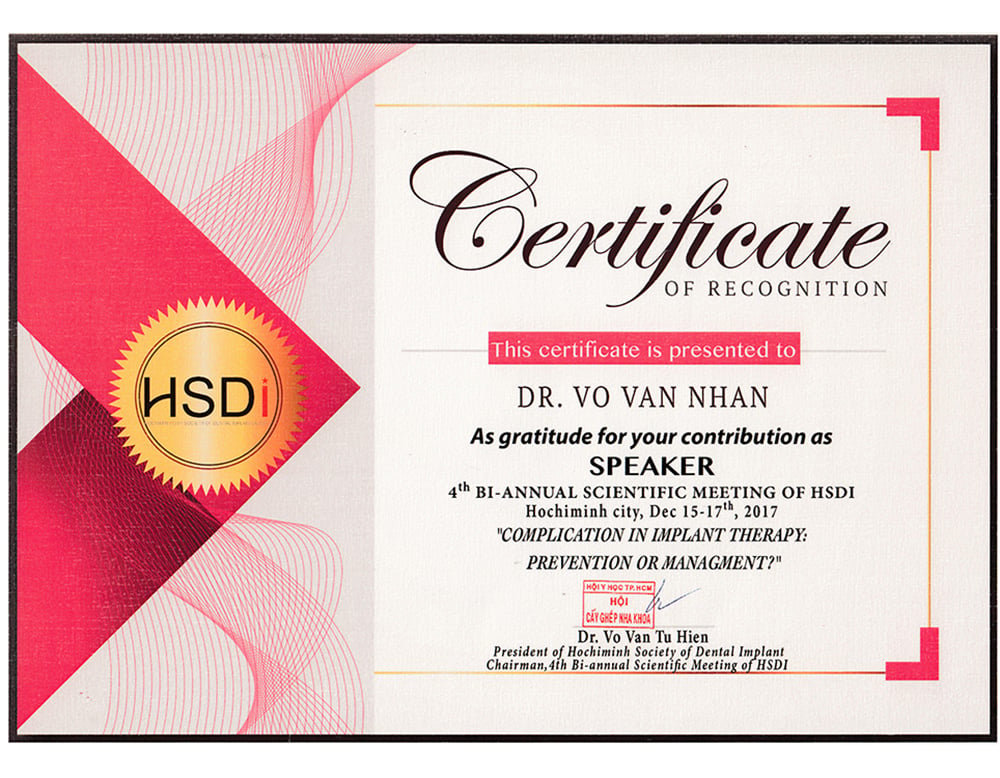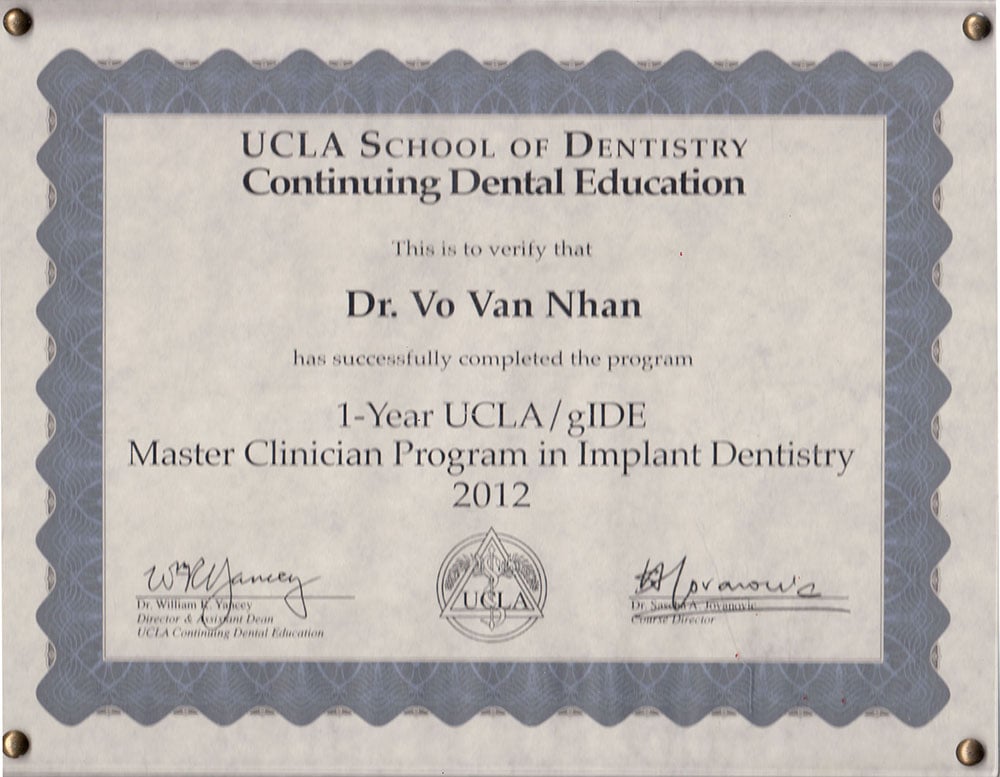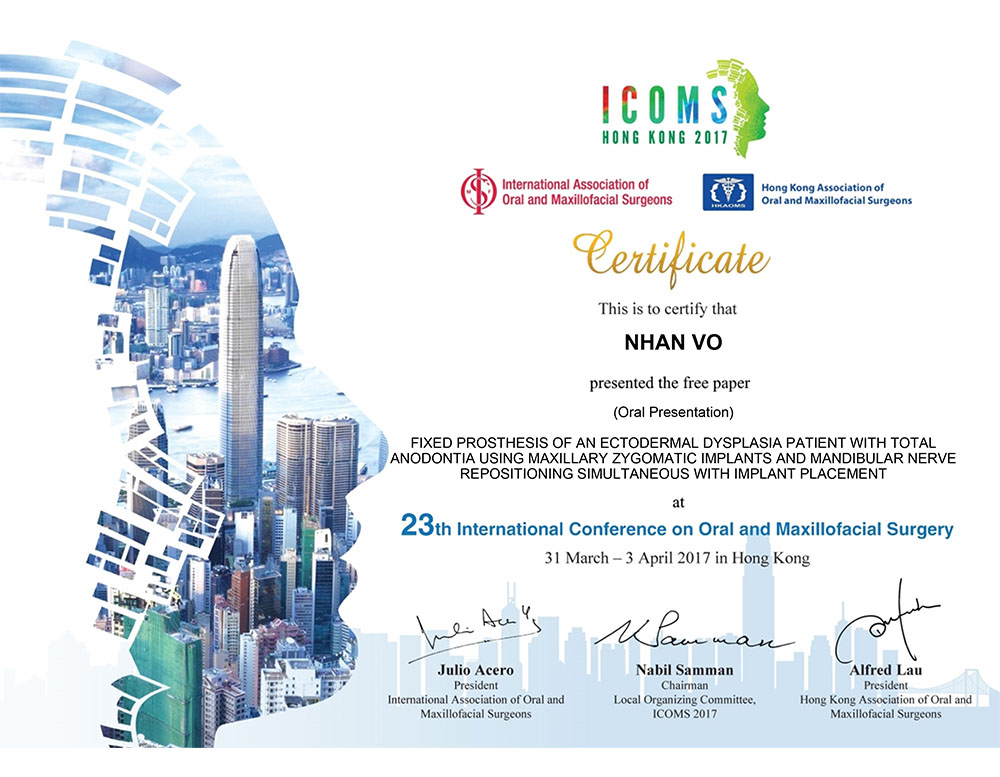The procedure for immediate implant placement at Nhan Tam Dental Clinic
The immediate implant placement is a widespread procedure in modern dentistry. This is a new method in the dental implant industry but has been applied quite widely and popular. So what is the immediate implant placement? This is Immediate Implant Placement Procedure at Nhat Tam Dental Clinic.
![]() Dental implants in Nhan Tam - 5 stars
Dental implants in Nhan Tam - 5 stars
![]() WHAT IS IMMEDIATE IMPLANT PLACEMENT?
WHAT IS IMMEDIATE IMPLANT PLACEMENT?
An immediate dental implant is a dental implant that is placed in the jawbone immediately after a dental tooth extraction. It is usually placed at the same visit as the dental extraction but it can be done within two weeks after the dental tooth extraction and still be considered an immediate dental implant.
Note:
- Alveolar bone requires an ideal condition for implant placement.
- The technique for atraumatic extraction of teeth will be applied for preventing bone fractures.
- Some position tooth cannot do immediate implant placement. If teeth have 3 roots or 2 big roots, 4 molar upper teeth and mandibular molars, immediate implant placement cannot be used.
Implantation of the implant immediately requires the bone to ensure the ideal condition
Advantages of implant immediately
- Reduction in overall treatment time
- Reduced number of surgeries, thus reducing the overall cost and morbidity
- Maintenance of soft tissue profile
![]() THE PROCEDURE FOR IMMEDIATE IMPLANT PLACEMENT AT NHAN TAM DENTAL CLINIC
THE PROCEDURE FOR IMMEDIATE IMPLANT PLACEMENT AT NHAN TAM DENTAL CLINIC
Step 1: General examination and direct consultation
In this step, the doctor will collect some information about your medical history and dental history.

Doctors consultation and treatment before implant dental implant
Step 2: Take Cone Beam-CT and Panorapanoramic radiographs.
This doctor will get:
- Three-dimensional image of the jaw.
Benefit:
- Assess the quality and quantity of bone.
- Determine the ideal implant placement.
- Increase the maximum safety and accuracy levels to avoid the mistaken direction of errors in the implant placement.
- Examine the tightness of implant prosthesis.
- Shorten treatment time.
- Determine the size, length, depth, and width of the jaw bone tissue that is suitable for the implant or not to formulate effective treatments.
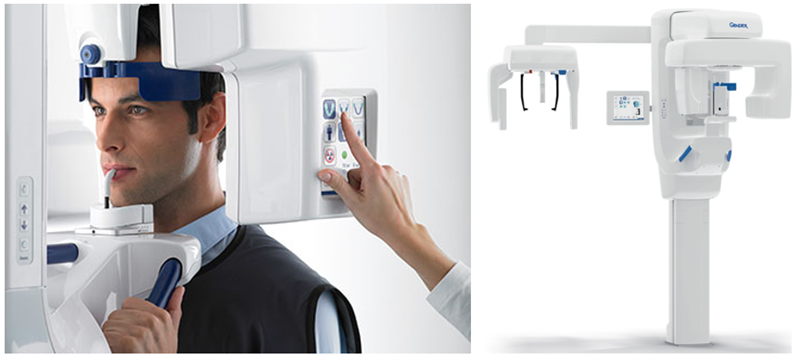
CT Cone Beam 3D delivers the most accurate results
Step 3: Image analysis and give consultation
Through image analysis, the doctor will identify the volume and density of the bone to determine whether an implant can be placed immediately or in a delayed approach.
- Full volume of bone and gums:
Sufficient bone volume and gum thickness are requirements for implant placement.
- Insufficient bone quality and gum volume:
Solution: Bones or gums need to be grafted to ensure that there is 2mm bone covering the implant and gingival thickness at least 1.1mm and must have gingival keratinization.
Bone Grafts: Autologous bone graft is the best material because it contains growth factors for healing quickly and bones are made of live cells to limit the possibility of reactive excretion. In some cases, however, artificial bone can be utilized.
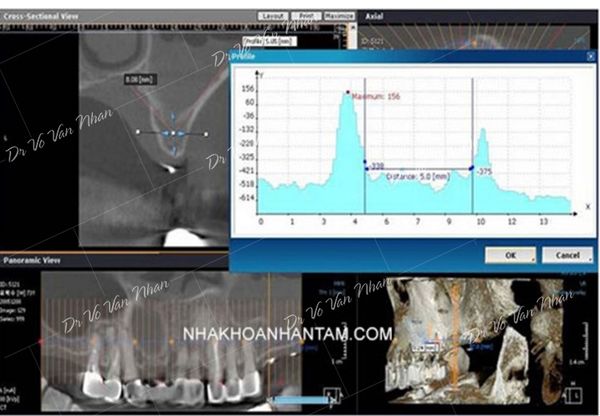
Perform quality imaging of the jaw to provide effective treatment regimens
Step 4: Get a sample and determine the ideal location for the implants by using specialized software.
Get a sample: To get specific information about the dental condition.
Assumptions for implant placement: Bone analysis and implant placement assumptions on specialized software.
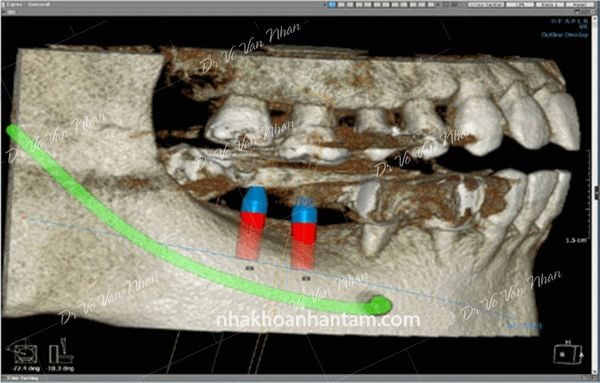
The system assumes the position of the implant cylinder
Step 5: Make the treatment plan
Based on the condition of your oral tissues, oral hygiene and personal habits, and commitment to follow aftercare instructions, your dentist will advise you of the most appropriate treatment plan.
Depending on your situation, your dental professional will advise you of how long the entire treatment process will take, how many appointments will be necessary and what you can expect after each procedure. The estimated cost of your dental implants will also be discussed during this meeting.
Step 6: Atraumatic extraction of teeth
Extraction was performed using the extraction kip tips. The arrowlike tip was brought into the sulcus over a 4-to-5 mm depth, without first seperating the gingiva from the tooth, around the entire tooth circumference. Then, the straight or angled syndesmotomes were used to cut the PDL fibers deeper. After sectioning of the PDL fibers, the tooth was mobilized with a Claude Bernard syndesmotome and removed from the socket with tweezers.
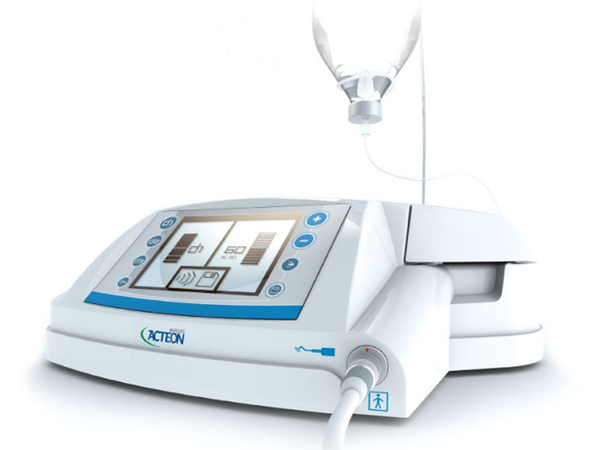
Extraction of the injured tooth with a Piezotome
Step 7: Placing the detal implant
Before Implant Surgery:
- Oral hygiene, removal of plaque, inflammatory periodontal treatment.
- Using mouthwash containing a chlorhexidine component to antiseptic.
- Take antibiotic prophylaxis.
During Implant Surgery:
- Anesthesia or narcosis .
- Your oral surgeon makes a cut to open your gum and expose the bone. Holes are drilled into the bone where the dental implant metal post will be placed. Since the post will serve as the tooth root, it's implanted deep into the bone.
- At this point, you'll still have a gap where your tooth is missing. A type of partial, temporary denture can be placed for appearance, if needed.
After Implant Surgery:
- Continue to use mouthwash containing chlohexidine.
- Follow-up your doctor visit.
- After surgery, you may need to eat soft foods while the surgical site heals.
Step 8: Make porcelain teeth
Types of dental porcelain crowns: There are many kinds of porcelain crowns suitable for the price and aesthetics to give patients more choices.
Respond to the technical requirements: finish line, frame, color, shape of teeth,ect.
Strict adherence to procedures: Any dental porcelain products that do not meet the quality requirements and aesthetics will be removed and remade from the first stage.
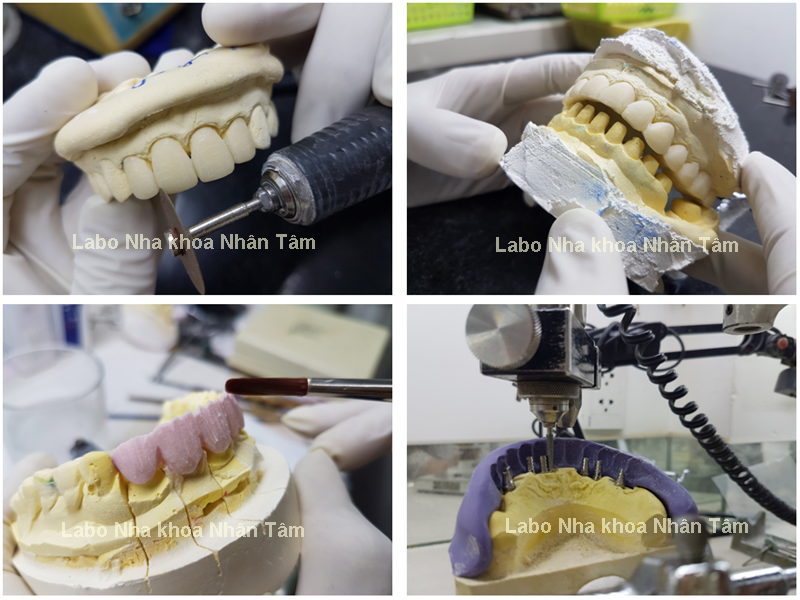
The modern Labo system at Nhat Tam Dental Clinic helps the implant dentist quickly
Step 9: Perform teeth restoration on Immediate Implant
This is the last and most important step because it is harder and more complicated than normal dental restorations. If the crown is not tight with implant healing, it will cause bad breath, and gingivitis. When the condition gets worse, it cause inflammation around the implant. This is known as peri-implantitis and over time, may lead to implant loss.
These are immediate implant placement information and procedure after the extraction of teeth at Nhan Tam Dental Clinic. With this procedure, you can be assured of implant placement in our dental clinic.
![]() Our highly-skilled and experienced dentists in the field of cosmetic dentistry help you restore your teeth effectively and prevent unnecessary complications.
Our highly-skilled and experienced dentists in the field of cosmetic dentistry help you restore your teeth effectively and prevent unnecessary complications.
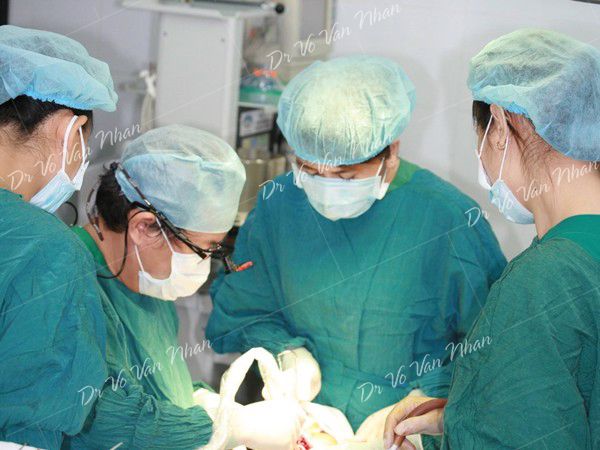
Nhan Tam Dental Clinic owns a team of highly skilled doctors
![]() Successfully implant placement with modern implants performing quickly, painlessly and discomfortable, provides healthy teeth.
Successfully implant placement with modern implants performing quickly, painlessly and discomfortable, provides healthy teeth.
![]() The implant placement process is carried out as quickly, canonical and safety required by the Ministry of Health under the support of modern equipment.
The implant placement process is carried out as quickly, canonical and safety required by the Ministry of Health under the support of modern equipment.
![]() Equipped with Laboratory labs with skilled technicians, making porcelain teeth accurately and quickly, saving in patients' waiting time and significantly reducing the cost of making porcelain.
Equipped with Laboratory labs with skilled technicians, making porcelain teeth accurately and quickly, saving in patients' waiting time and significantly reducing the cost of making porcelain.
![]() The system of modern facilities and separate service rooms respond to aseptic standards, ensuring absolute safety.
The system of modern facilities and separate service rooms respond to aseptic standards, ensuring absolute safety.
NHAN TAM DENTAL CLINIC
Address: 801-809, 3/2 Street, Ward 7, District 10, HCMC
Hotline: 1900 56 5678
Thanks for visiting www.nhakhoanhantam.com

FIVE GOLDEN ELEMENTS MADE THE NHAN TAM DENTAL CLINIC BRAND
COME WITH US TO GET YOUR HEALTHY TEETH





